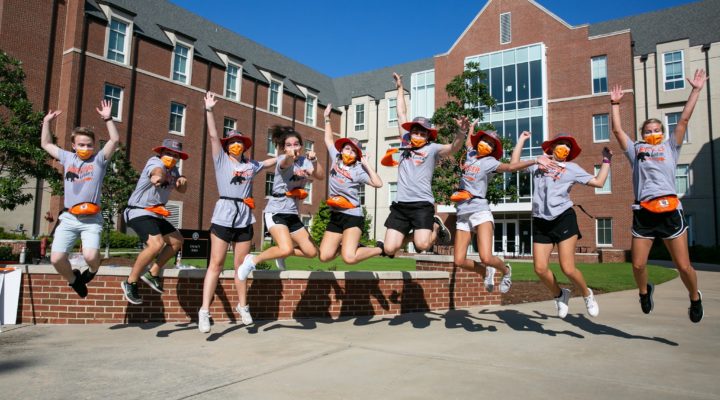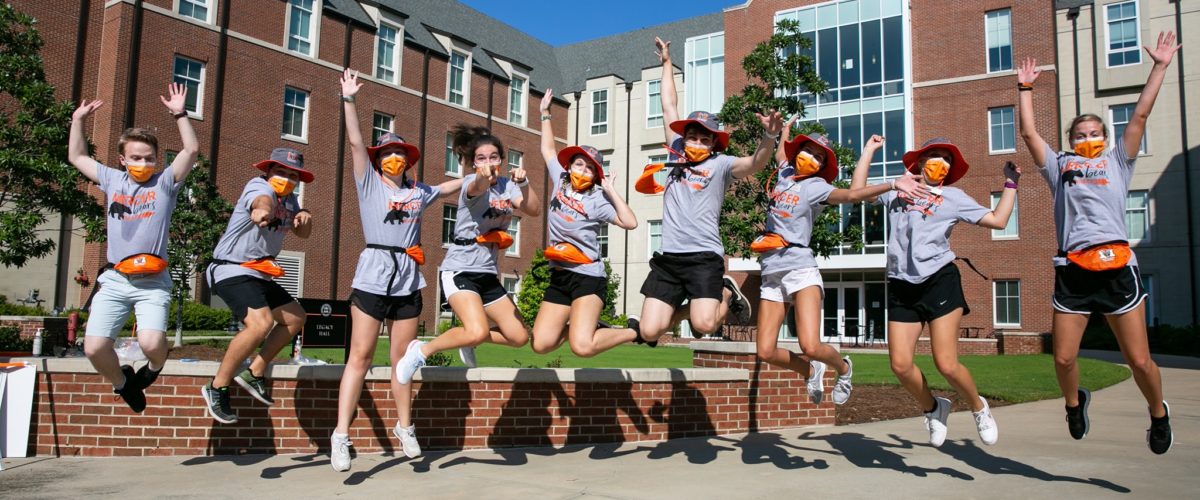As students of all ages stream back to school — whether virtually or in person — Baptist universities are among the institutions implementing new strategies due to COVID-19.
Mercer University in Macon, Ga., invested about $750,000 to create an on-campus COVID-19 testing lab capable of processing about 800 coronavirus tests per eight-hour shift, said Larry Brumley, senior vice president for marketing communications and chief of staff.
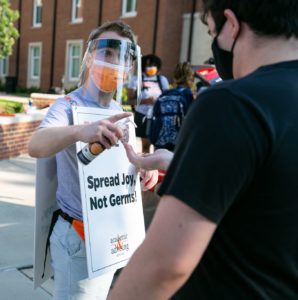
A hand sanitizer station at Mercer University.
The testing began around July 27 when students started arriving at Mercer’s residential campus in Macon for orientation, athletics and band. They had the choice of being tested by Mercer or at outside labs of their choosing. About half were tested by the school.
“Most test results have been returned within 24 hours,” and results will be publicly released in a matter of days, he said. “All this testing will give us a baseline to know what the level of spread is among the university community at the beginning of the fall semester.”
In-person classes at Mercer began Aug. 18.
In cases of positive COVID-19 tests, students may return home or isolate in accommodations provided by Mercer. That protocol, together with the lab and face mask and social distancing requirements, is designed to prevent the spread of the coronavirus during the term.
“We’ll be doing surveillance testing throughout the fall semester as part of our plan to stay on top of the virus” Brumley said.
At Simmons College of Kentucky — a historically Black college — the dangers of coronavirus have been all too real because the virus has proved more dangerous and deadly among people of color.
“The leadership of the college has continued to monitor the status of the Covid-19 pandemic, which has worsened and continues to hit Black communities hard, due to America’s patterns of economic injustice,” President Kevin Crosby said in a July 31 letter to faculty, staff and students.

Simmons College of Kentucky has moved to an all-online instruction format for now.
As a result, courses at Simmons will be offered remotely while in-person support opportunities will be provided as much as safely possible, Crosby said.
According to a recent National Urban League report, the Black community is three times more likely to contract the virus, and twice as likely to die, than whites.
“When we looked at the numbers to decide on fall plans, we knew we had to double whatever the local data showed because COVID has hit Black communities doubly hard,” said Chris Caldwell, Simmons’ vice president for academic affairs.
However, the decision to go remote poses its own challenges for many of the students at the Louisville college, he added. “Many of our students are parents of public school students, and within that group many are single parents, so they’re juggling jobs, our coursework and their kids’ coursework.”
In Waco, Texas, one of the nation’s largest private faith-based universities has ramped up with elaborate plans for learning in the time of coronavirus. “It’s a little bit wild right now,” said Jason Cook, vice president for marketing and communications and chief marketing officer.
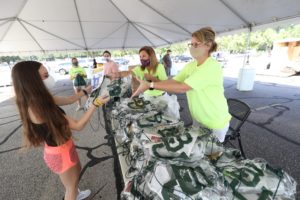
Baylor University students receive bags of COVID-related supplies as they arrive on campus.
Baylor recently sent out 18,000 COVID-19 tests, requiring every student, faculty and staff member to test negative before being allowed onto campus for the fall term, which begins Aug. 24.
“And how we handle positive tests has been a major focus for us the past couple of weeks,” Cook said, adding that less than 1% of the tests have been positive as of Aug. 19.
During the semester, 10% of students will be randomly tested in addition to any who are showing symptoms. Quarantine and isolation facilities will be provided on and off campus for students who have either been in contact with someone who is sick or test positive themselves.
Baylor anticipates 5,000 students living on campus this fall, mostly assigned to two-person dorm rooms, and another 18,000 off-campus — the usual numbers, Cook explained.
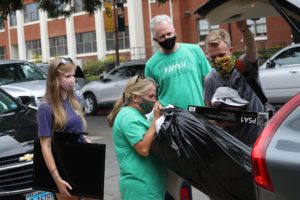
Move-in day at Baylor University looks a lot like every year, except for the masks everywhere.
Pandemic-inspired differences this semester include the availability of hybrid and online classes together with in-person learning, a lengthened class day and 16 large tents erected on campus to provide an additional 45,000 square feet of dining, study, musical performance and student group meeting spaces. Students also are being issued kits with sanitizer, masks, thermometers and other items.
Baylor football currently is scheduled to play an abbreviated schedule with its stadium at a quarter of its 45,000-seat capacity.
Whether these and other measures prove effective will be determined by the compliance of each member of the Baylor community, Cook said. “It’s going to depend on the behaviors and actions of individual people wearing face masks, washing their hands and maintaining social distance.”

